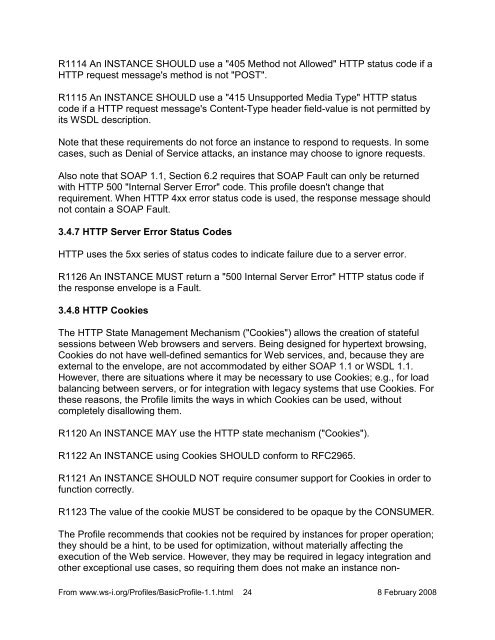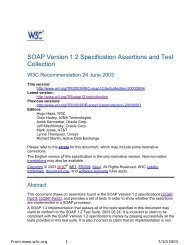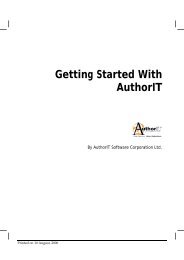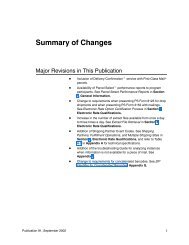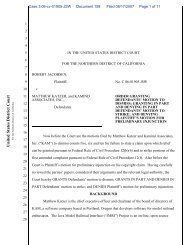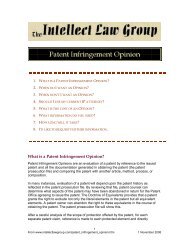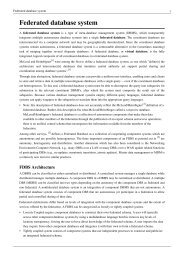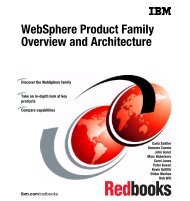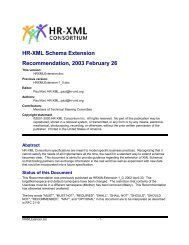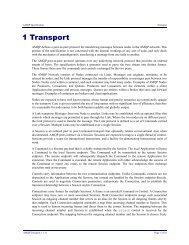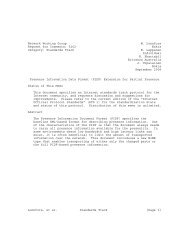WS-I Basic Profile Version 1.1 - instructional media + magic
WS-I Basic Profile Version 1.1 - instructional media + magic
WS-I Basic Profile Version 1.1 - instructional media + magic
Create successful ePaper yourself
Turn your PDF publications into a flip-book with our unique Google optimized e-Paper software.
R1114 An INSTANCE SHOULD use a "405 Method not Allowed" HTTP status code if a<br />
HTTP request message's method is not "POST".<br />
R1115 An INSTANCE SHOULD use a "415 Unsupported Media Type" HTTP status<br />
code if a HTTP request message's Content-Type header field-value is not permitted by<br />
its <strong>WS</strong>DL description.<br />
Note that these requirements do not force an instance to respond to requests. In some<br />
cases, such as Denial of Service attacks, an instance may choose to ignore requests.<br />
Also note that SOAP <strong>1.1</strong>, Section 6.2 requires that SOAP Fault can only be returned<br />
with HTTP 500 "Internal Server Error" code. This profile doesn't change that<br />
requirement. When HTTP 4xx error status code is used, the response message should<br />
not contain a SOAP Fault.<br />
3.4.7 HTTP Server Error Status Codes<br />
HTTP uses the 5xx series of status codes to indicate failure due to a server error.<br />
R1126 An INSTANCE MUST return a "500 Internal Server Error" HTTP status code if<br />
the response envelope is a Fault.<br />
3.4.8 HTTP Cookies<br />
The HTTP State Management Mechanism ("Cookies") allows the creation of stateful<br />
sessions between Web browsers and servers. Being designed for hypertext browsing,<br />
Cookies do not have well-defined semantics for Web services, and, because they are<br />
external to the envelope, are not accommodated by either SOAP <strong>1.1</strong> or <strong>WS</strong>DL <strong>1.1</strong>.<br />
However, there are situations where it may be necessary to use Cookies; e.g., for load<br />
balancing between servers, or for integration with legacy systems that use Cookies. For<br />
these reasons, the <strong>Profile</strong> limits the ways in which Cookies can be used, without<br />
completely disallowing them.<br />
R1120 An INSTANCE MAY use the HTTP state mechanism ("Cookies").<br />
R1122 An INSTANCE using Cookies SHOULD conform to RFC2965.<br />
R1121 An INSTANCE SHOULD NOT require consumer support for Cookies in order to<br />
function correctly.<br />
R1123 The value of the cookie MUST be considered to be opaque by the CONSUMER.<br />
The <strong>Profile</strong> recommends that cookies not be required by instances for proper operation;<br />
they should be a hint, to be used for optimization, without materially affecting the<br />
execution of the Web service. However, they may be required in legacy integration and<br />
other exceptional use cases, so requiring them does not make an instance non-<br />
From www.ws-i.org/<strong>Profile</strong>s/<strong>Basic</strong><strong>Profile</strong>-<strong>1.1</strong>.html 24 8 February 2008


